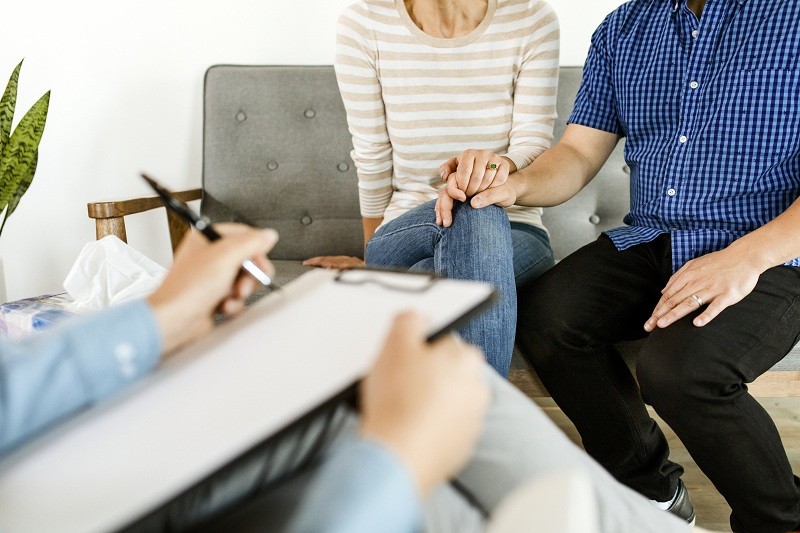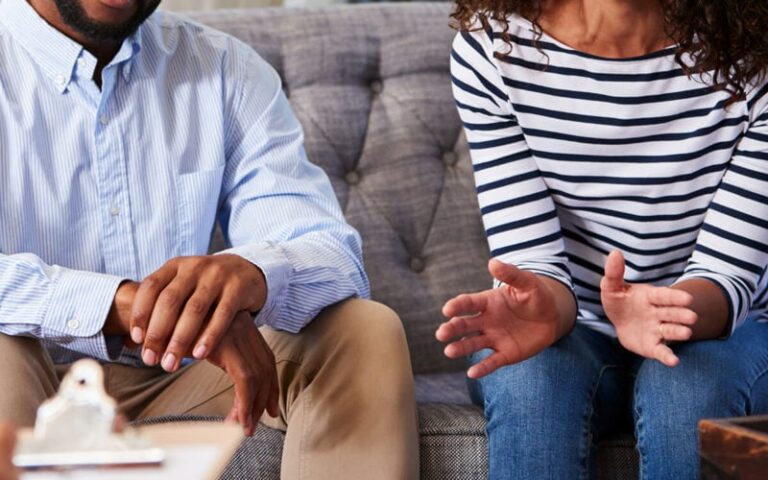Are you and your partner struggling to move past negative patterns in your relationship?
Couples therapy can help you identify and break down those patterns so that both of you can have a healthier, more fulfilling relationship.
You deserve the chance to build a healthy relationship – let couples therapy be your guide.
Negative patterns are developed as a result of behaviors such as defensiveness, criticism, stonewalling, contempt, or avoidance. These behaviors may be based on feelings of fear and distress, but their cumulative effects can lead to decreased connection and increased conflict. In time, even positive experiences between couples become overshadowed by the negative atmosphere and distance that has been created.
What makes these dynamics particularly challenging to detect is that all too often couples have become practiced in being dismissive or evasive when it comes to discussing difficult topics. Consequently, many couples struggle for years without realizing that their behavior has become problematic for their relationship well-being — until it’s almost too late. Going to couples therapy and working with a professional who is experienced in addressing these issues can be invaluable in helping you recognize your role in the dynamic and providing tools for breaking the negative cycle.
Understanding the Causes of Negative Relationship Patterns

Negative relationship patterns exist when couples engage in the same destructive practices without recognizing the impact of their behaviors. These patterns develop due to a combination of psychological, emotional, and social factors. Understanding what creates and perpetuates negative relationship patterns is crucial for couples who want to build healthier foundations in their relationships.
Psychological Factors: Psychological factors like trauma, trauma symptoms, and unresolved issues from childhood or previous relationships can be underlying causes that lead to the development of negative relationship patterns. It is important to recognize that traumatic experiences can be kept in the background and can easily become a factor in a marriage or other intimate relationship if not addressed early on.
Emotional Factors: Emotional distress such as frustration, anger, disappointment, guilt, or hurt create an atmosphere where couples experience high levels of stress within their relationships. One of the breakthroughs couples therapy can offer is the recognition of underlying attachment styles. For example, a fearful-avoidant attachment style can fuel a destructive cycle that may be difficult to break without professional guidance.
Social Factors: Negative patterns are often perpetuated by couples communicating in aggressive or passive-aggressive ways with one another or engaging in isolating behaviors such as controlling communication through social media platforms and refusing interdependence within their own home. Social networks also play an important role; when toxic friends are present in a couple’s life it becomes more difficult for them to listen constructively to each other and compromise with one another during conflicts.
Benefits of Couples Therapy

Couples therapy is a powerful resource for helping couples in a long-term committed relationship break negative patterns and develop healthier, more constructive ways of interacting with one another. It is especially effective for couples who find themselves continuously in conflicts or stuck in a loop of unproductive and counter-productive behaviors. Through guided conversations and structured activities, a couple can gain insight into not only what’s going on between them but also why it keeps happening over and over.
In addition to providing space for the couple to communicate openly without judgment, couples therapy can help them develop the skills they need to approach subjects constructively. The techniques used vary depending on the type of therapy used but may include: identifying feelings and where they come from; expressing feelings openly; using active listening techniques; understanding each other’s perspectives; developing empathy; validating feelings; compromising and creative problem-solving skills. These skills can lead to greater trust and understanding, improved communication, better decision-making as well as the improved emotional connection between partners.
The overall goal of couples therapy would be to change the negative patterns that have been established so that both partners feel emotionally safe with one another again. With committed effort from both parties — along with guidance from an experienced therapist — it is possible for couples to work through these issues in order to build meaningful relationships based on respect, kindness, and patience.
How to Find a Reputable Therapist?

Finding a good couples therapist can seem daunting, but it’s well worth the effort. The best way to find a good couples therapist is to ask people you know if they have any recommendations or do some research online. It’s important to look for someone who is experienced and reputable, as well as someone to who you feel comfortable talking.
In addition, it’s worth looking for therapists who specialize in relationship counseling and understand your particular issues. Don’t be afraid to ask questions prior to making an appointment; inquire about their qualifications, experience, and fees. It might also be helpful to read reviews of different therapists in order to get an idea of what past clients have had to say about them. Finally, make sure you’re both willing to put in the work necessary for the therapy sessions – this will help ensure its success!
Tips for Making the Most of Couples Therapy

Preparing for the sessions ahead of time and being open-minded during counseling are key to getting the most out of couples therapy. Here are a few tips for making the most out of couples therapy:
1. Make a list of topics – Before attending couples therapy, both partners should spend some time writing down their thoughts and feelings on the issues they want to focus on during sessions. Writing these things down can help make it easier to talk about them in an organized fashion when meeting with a therapist.
2. Confront issues head-on – It is important, to be honest, and open during each session, no matter how difficult or emotionally charged certain topics may be. If one partner feels uncomfortable talking about something in particular, have a conversation beforehand so that both individuals will feel comfortable discussing any issue with their therapist without fear of judgment.
3. Persevere through setbacks – Conflict resolution doesn’t happen overnight, so try not to get discouraged if things don’t seem to get better immediately. Being able to identify triggers that cause tension and then working together with a therapist to find strategies for de-escalating those situations can take time but is well worth it in the end!
4. Be willing to change – No relationship is ever perfect –– there will always be room for improvement, however small it may be! Accepting this reality leaves both parties free to explore potential solutions together within their therapeutic environment, as opposed to avoiding addressing problems altogether because of fear or embarrassment at admitting fault.
Conclusion
Conflict in relationships is a natural part of life, but it doesn’t have to be destructive. Couples can use positive strategies such as communicating openly and honestly, taking time for reflection, practicing active listening, and compromising to resolve disputes in a constructive way. With the help of couples therapy, couples can learn new skills and better ways of relating to one another which will enable them to break negative patterns in their relationships and foster healthy connections.

